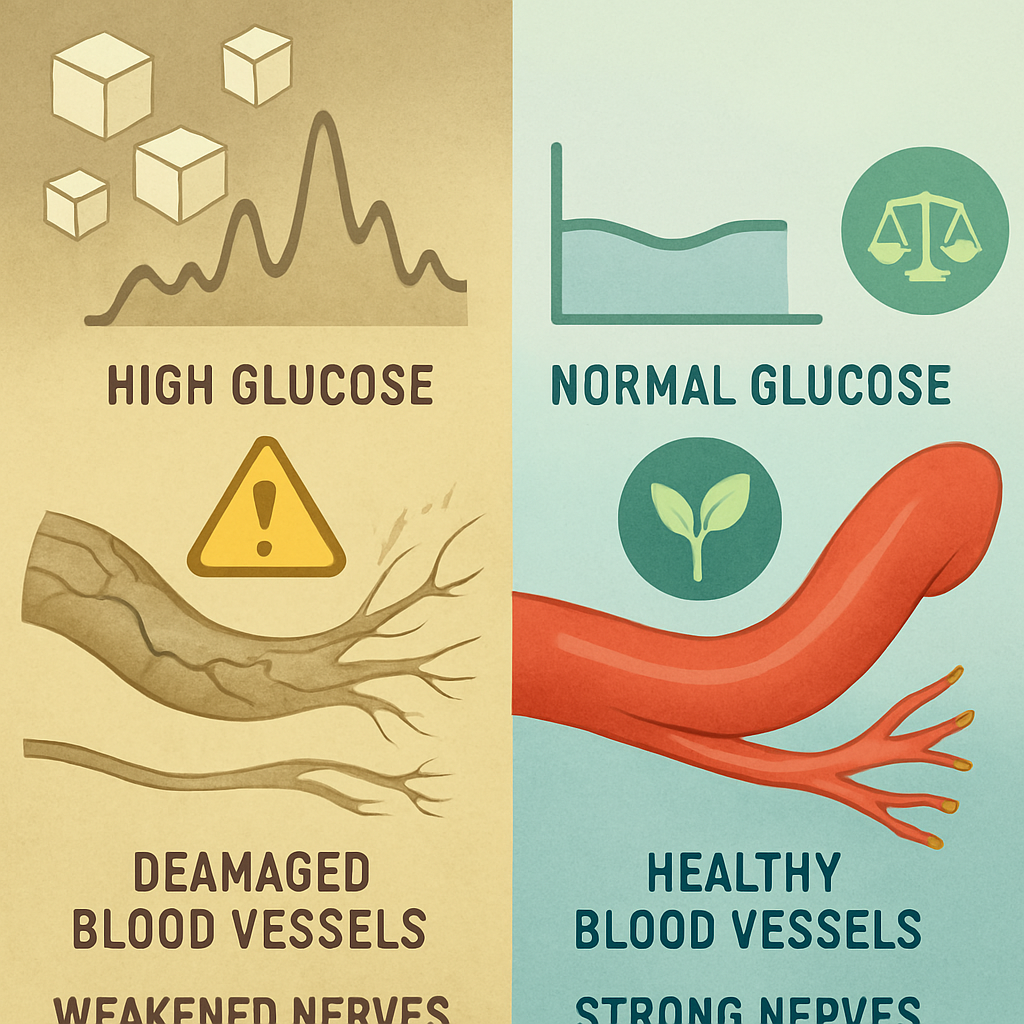A Common but Often Overlooked Complication
Erectile dysfunction (ED) is a common complication for men living with diabetes — and often one of the first signs of trouble with blood sugar control. In fact, men with diabetes are two to three times more likely to experience ED than men without the condition. While it can be frustrating and emotionally draining, understanding the link between diabetes and ED is the first step toward taking control and improving both sexual function and overall health.
How Diabetes Affects Erections
An erection requires coordinated function of the nervous system, blood vessels, hormones, and psychological state. Diabetes interferes with all of these systems. Chronically high blood sugar levels damage blood vessels and nerves throughout the body — including those that control blood flow to the penis and the sensation of arousal. This condition is known as diabetic neuropathy, and it can significantly impair the ability to achieve or maintain an erection.
The Role of Blood Flow
One of the primary ways diabetes contributes to ED is through poor circulation. High glucose levels cause inflammation and lead to atherosclerosis — a narrowing and hardening of the arteries. This reduces blood flow to the penis, making erections weaker or harder to sustain. In many cases, ED can be an early warning sign of broader cardiovascular disease, especially in diabetic men.
Nerve Damage and Sensation Loss
Diabetes-related nerve damage (neuropathy) can dull the signals between the brain, spinal cord, and genitals. This reduces sensitivity and makes it more difficult to become aroused or respond to sexual stimulation. Over time, this lack of responsiveness can worsen performance anxiety and create emotional distance between partners.
Hormonal Imbalances
Men with diabetes, especially those with type 2, often experience lower levels of testosterone, the key hormone responsible for libido and erectile strength. Insulin resistance and obesity — common in type 2 diabetes — further suppress testosterone production and create a hormonal environment that makes sexual performance more difficult.
Psychological Impact
Living with diabetes can be stressful and emotionally exhausting. Depression, anxiety, low self-esteem, and relationship strain are all more common among diabetic patients — and each of these factors can contribute to or worsen ED. Mental health must be addressed as part of any effective treatment plan.
Diabetes Medications and ED
Some medications used to manage diabetes or related conditions may also contribute to erectile dysfunction. These include:
- Certain antihypertensives (used for high blood pressure)
- Some antidepressants
- Diuretics or beta-blockers
It’s important not to stop taking prescribed medications without consulting a doctor, but alternatives or dosage adjustments may be possible.
Managing ED With Diabetes: What Works
1. Improve Blood Sugar Control
Keeping blood glucose levels within target range is the most important step in preventing or improving ED. Good blood sugar control reduces nerve damage, supports blood flow, and stabilizes hormones. Track your A1C, use a continuous glucose monitor if needed, and follow your care team’s plan closely.
2. Adopt a Heart-Healthy Lifestyle
Since diabetes and ED are both vascular in nature, what’s good for the heart is good for sexual performance. Focus on:
- Regular physical activity (cardio + resistance training)
- A balanced diet rich in vegetables, whole grains, lean protein, and healthy fats
- Weight management, especially if you carry excess abdominal fat
- Smoking cessation and limiting alcohol
3. Get Enough Sleep
Sleep is essential for testosterone production and blood sugar regulation. Aim for 7–9 hours of quality sleep per night. Poor sleep increases insulin resistance and cortisol, both of which worsen ED.
4. Address Testosterone Levels
Ask your doctor to check your total and free testosterone levels. If they’re low, lifestyle changes can often help — but testosterone replacement therapy (TRT) may be appropriate in certain cases.
5. Treat Depression and Anxiety
Cognitive behavioral therapy (CBT), counseling, or medication may be needed to address the mental health impact of both diabetes and ED. Don’t underestimate the role of emotional wellness in sexual function.
6. Use ED Medications Safely
Drugs like sildenafil (Viagra) or tadalafil (Cialis) can be effective for men with diabetes-related ED, especially when combined with lifestyle changes. They improve blood flow and responsiveness. Be sure to consult your doctor, especially if you take medications for blood pressure or heart disease.
7. Explore Other Options if Needed
For men who don’t respond to oral medication, other solutions include:
- Penile injections (alprostadil)
- Vacuum erection devices (VEDs)
- Intraurethral suppositories
- Penile implants in severe or persistent cases
Preventing ED in Diabetic Men
Early and consistent management of diabetes is the best way to prevent ED. Regular checkups, blood sugar monitoring, and attention to symptoms like decreased libido or morning erections can help catch problems early. Taking a proactive approach reduces complications and helps maintain both physical and emotional intimacy.
It’s Treatable — and You’re Not Alone
ED can feel isolating, but it’s extremely common among men with diabetes. The most important thing is to recognize it as a medical issue — not a personal failing. With proper care, most men can improve or reverse their symptoms. By managing your diabetes and taking care of your body, you don’t just improve your erections — you support your energy, confidence, and connection with your partner.
